Reply To:
Name - Reply Comment
Last Updated : 2024-04-23 17:11:00

From left: World Bank Director Strategy and Operations, Human Development and Director Education Global Practice Dr. Amit Dar, Malaysia Perak State Chief Minister Dr. Zambry Abdul Kadir, Prime Minister Ranil Wickremesinghe and India Telangana Government IT, Municipal Administration and Urban Development, Industries and Commerce, Public Enterprises, Sugar, Mines and Geology, NRI Affairs Minister Shri K. T. Rama Rao
Pix by Nisal Baduge
By Shabiya Ali Ahlam
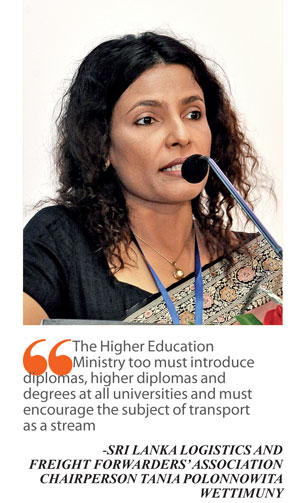 The ‘relationship’ between human capital and economic development is a strong one, but in the race of achieving economic progression, this connection is seldom given much heed, at least in the case of developing nations.
The ‘relationship’ between human capital and economic development is a strong one, but in the race of achieving economic progression, this connection is seldom given much heed, at least in the case of developing nations.
In Sri Lanka, the scenario is not very different as the hue and cry for the development of human capital has been heard for years, if not for decades, by the private sector, acknowledged as the engine of growth. While much talk has been going on how the country would prepare itself to have a workforce that is future ready, not much has been achieved in this regard largely due to the lack of focus and formulation of the right strategies.
Human capital refers to the knowledge, skill sets and motivation that people have, which provide economic value. It realizes that not everyone has the same skill sets or knowledge and that quality of work can be improved by investing in people’s education. Given the fast-paced growth the global economy is witnessing, experts across the world have stressed that investing in education alone is insufficient and it is imperative to emphasise on skill and talent development if any nation is to thrive and sustain in the ever-evolving world.
Sri Lanka Human Capital Summit 2016 was held recently to deliberate and identify human capital  opportunities to develop a national agenda for Sri Lanka that would in turn support the country’s growth sectors.
opportunities to develop a national agenda for Sri Lanka that would in turn support the country’s growth sectors.
While the overly packed agenda that revolved around the theme ‘Towards a Future Ready Workforce’ left little room for productive discussion, it did serve as a platform for the private sector to shed light on the issues faced by them in this regard.
Surviving in a complex world
Competing in today’s global economy is a complex task as not only do countries need technical skills but also flexibility in the work environment.
According to World Bank Director Strategy and Operations, Human Development and Director Education Global Practice Dr. Amit Dar, this is the very reason as to why investing in skills is vital for a country’s economic growth and maintaining competitiveness. In particular, education systems, he stressed must be oriented to including youth who have strong foundational skills and specific skills for jobs. The need for job-specific skills has been growing across the world and the quality and the supply of skilled labour have become ‘major’ roadblocks. Today, employers around the world also demand for technical and soft skills.
While across-the-board skill development remains a major concern around the world, for Sri Lanka, building job-relevant skills is a “primitive step” in becoming a competitive and efficient middle-income economy, said Dr. Dar.
“The change in economic growth and structure has increased the demand for Sri Lankan labour, but the skill gap that has emerged in the changing labour market may be starting to hold back this economy,” Dr. Dar pointed out. It was asserted that given the current conditions of the global economy, which requires advanced skills, the workers must be able to adjust to not only shifts in the global domestic demand but also to the activities in the global economy and strive to become more competitive. And it is with the right labour skills and workforce that firms can be more competitive and productive, paving the way for economies the ability to move ahead “faster”, creating more and better jobs, said Dr. Dar.
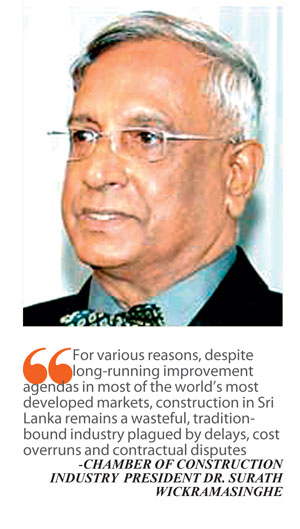 On the 2015-2016 Global Competitiveness Report published by the World Economic Forum, Sri Lanka scored 4.21 points out of seven. Sri Lanka averaged 4.12 points in Global Competitiveness Index from 2007 until 2016, reaching an all-time high of 4.32 points in 2012 and a record low of 3.84 points in 2007.
On the 2015-2016 Global Competitiveness Report published by the World Economic Forum, Sri Lanka scored 4.21 points out of seven. Sri Lanka averaged 4.12 points in Global Competitiveness Index from 2007 until 2016, reaching an all-time high of 4.32 points in 2012 and a record low of 3.84 points in 2007.
Dr. Dar noted that although the Sri Lankans spend more time in education than many of its neighbouring countries, the employers are questioning the system’s quality and relevance. Despite the measures taken to address these issues, the employers are said to be “still complaining” of big mismatches between the supply and demand, which undermine productivity and growth.
“This highlights the disparities in the learning outcome in the primary and secondary education. The lack of access to vocational training and higher education limits the government’s ability to push forward growth,” noted Dr. Dar.
Story of Malaysia and India
Calling 2016 a challenging year for the global economy, Malaysia Perak State Chief Minister Dr. Zambry Abdul Kadir noted that Malaysia and Sri Lanka were not amongst the list of countries that were able to dodge the impact of the turbulence that spilled over from the global economy, which 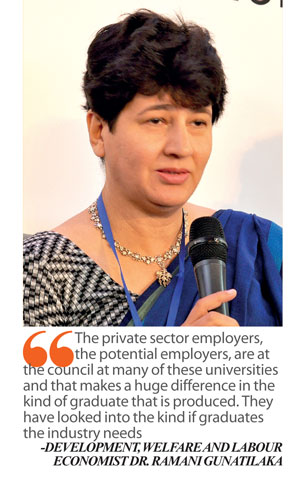 highlights its connectivity to the rest of the world.
highlights its connectivity to the rest of the world.
However, against this backdrop, he stressed it has now become more pertinent that nations such as Sri Lanka understand human capital development as key drivers for inclusive and sustainable growth.
“It is clearly stated that the fourth industrial revolution will lead to a profound change across all industries, reshaping production, presumption, transportation and delivery system. The change is due to technologies and subsequently it allows talent to connect to the market in a whole new way.It is important that we manage these transitions for the optimal outcomes and that calls for leadership and wider knowledge,” expressed Dr. Kadir.
Touching on the Malaysian story, a multinational and multicultural country, Dr. Kadir noted that given its status, Malaysia required a masterful management by the government due to the very demand of society. Since independence, Malaysia has managed to reduce the incidence of poverty and lessen income inequality, while achieving greater economic growth and maintaining racial harmony.
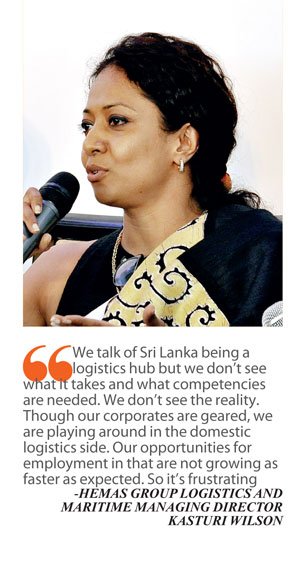 Malaysia reaps the benefit of those outcomes due to having formulated a range of polices and plans that laid the necessary foundation to crack the management of national development, especially post-1969.
Malaysia reaps the benefit of those outcomes due to having formulated a range of polices and plans that laid the necessary foundation to crack the management of national development, especially post-1969.
“It is important that no one is left behind or ignored. Of course that is a tall order but it has to be done for the sake of the people. Inclusive growth and development can be achieved by being firmly on the ground and feel the challenges of the people genuinely and find solutions,” stated Dr. Kadir. bMeanwhile, India Telangana Government IT, Municipal Administration and Urban Development, Industries and Commerce, Public Enterprises, Sugar, Mines and Geology, NRI Affairs Minister Shri K. T. Rama Rao stressed more should be done to develop creators than seekers. He opined that the biggest challenge faced by the South Asian region in terms of its human capital is the little attention paid to creating entrepreneurs, innovators and job creators.
“We don’t encourage risk taking, which stifles innovation. We don’t embrace and celebrate failures but rather look down upon on such,” stressed Rao. Showcasing Hyderabad’s efforts in fostering innovation and entrepreneurship, Rao noted that the strategy to create youth job creators than seekers helped in boosting confidence among the youth. A key initiative highlighted was the Telangana Academy for Skills and Knowledge, 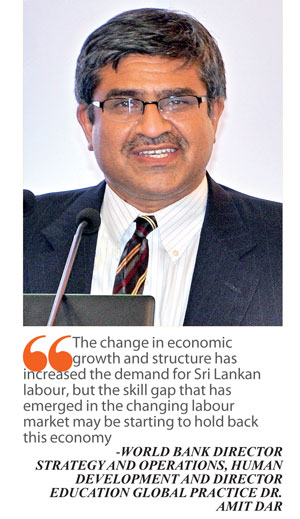 which promotes innovation, incubation and incorporation of start-ups creating many jobs.
which promotes innovation, incubation and incorporation of start-ups creating many jobs.
“If one thinks imparting skills is expensive then try ignoring it,” cautioned Rao.
Sri Lanka’s position in eyes of premier
Having acknowledged the dire need for attention in skill development, Prime Minister Ranil Wickremesinghe while delivering his keynote address said the time has come to bring the human resource policy to the limelight.
Though this was long overdue, Wickremesinghe stressed that the government owes it to the people after 30 years of conflict. “We have to deliver the good in the coming five years and that is a tall order,” he said.
Having spent about a year and a half from the five-year term, Wickremesinghe stressed the government is running out of time and the need to “open up” in the immediate future is fundamental.
“We need to open up. So all our planning on human development and human skills must take that big transformation into mind. It is not about how many IT professionals are there; it is about how many are willing to make a change in their mind-set,” said Wickremesinghe.
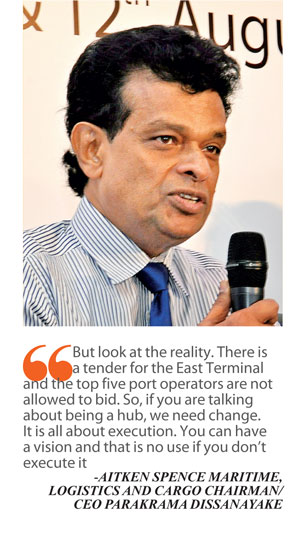 Highlighting human resources as the third most challenging factor for corporates, he stressed the need to embrace change to tackle the issues faced. While pledging the government’s commitment, he noted more has to be done within the limited time available. Sharing initiatives in this regard, it was said work is underway to ensure “education to employment continuum.” With approximately 60 percent of students dropping out at O/Ls, it was said that within the next two years, as an election commitment, the government would bring in 13 years of compulsory education. Sri Lanka will also see the establishment of an Education and Employment Act, which would cover the basic legal framework in which policies can be implemented.
Highlighting human resources as the third most challenging factor for corporates, he stressed the need to embrace change to tackle the issues faced. While pledging the government’s commitment, he noted more has to be done within the limited time available. Sharing initiatives in this regard, it was said work is underway to ensure “education to employment continuum.” With approximately 60 percent of students dropping out at O/Ls, it was said that within the next two years, as an election commitment, the government would bring in 13 years of compulsory education. Sri Lanka will also see the establishment of an Education and Employment Act, which would cover the basic legal framework in which policies can be implemented.
The National Human Development Council will be converted into an implementation agency where in addition to its current role, it would have the powers to also deal with employment consultation and other job placement centres.
“We must not look at how we can go up the ladder but how we can carry everyone up the ladder. What I don’t want to be is a country that will keep on supplying trained manpower to the rest 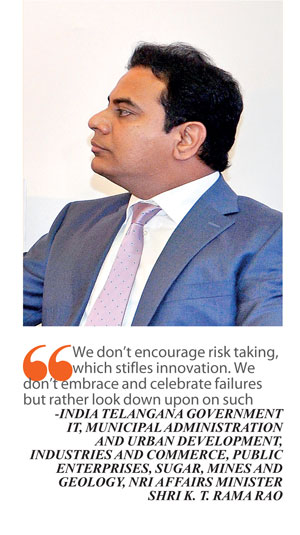 of the world. It is time that we added value to the services we can supply,” he stressed.
of the world. It is time that we added value to the services we can supply,” he stressed.
Hurdles in tourism: Training and pay
The tourism sector is faced with the mismatch of demand and supply of human capital and overcoming the same requires focused education, vocational and skill training with the help of ICT to create a highly skilled workforce.
United Nations World Tourism Organisation (UNWTO) Executive Director Marcio Favilla stressed that it is imperative for the private sector to focus on extending improved working conditions and competitive salaries to retain and attract the required workforce into the industry.
Pointing out the quality of service, innovation and creative thinking as strong competitiveness factors to address the key challenges for the future of human capital in tourism, Favilla asserted that despite Sri Lanka being labelled as the bright spot for South Asia, due to its high education enrolment rates and high completion rates of basic education, the nation still requires to better transmit the potential of its young population to the workforce.
“The tourism industry overall is more diversified than many other sectors in terms of employment opportunities, income generators through a complex supply chain of goods and services, therefore 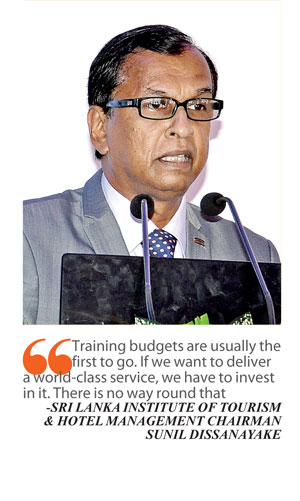 making it a labour-intensive sector requires professionals with different skill levels,” Favilla said.
making it a labour-intensive sector requires professionals with different skill levels,” Favilla said.
According to Favilla, it is mandatory now than ever to create partnerships and improve stakeholder engagement in the public and private sectors, trade associations, education and training providers and other stakeholders in the civil society to raise awareness for a better understanding of the tourism sector career paths.
With 2017 been given the theme of International Year of Sustainable Tourism for Development, Favilla opined it is the ideal opportunity for all stakeholders to develop actions and initiatives to raise awareness on the importance of the sector.
Meanwhile, highlighting the ground level issues was Sri Lanka Institute of Tourism & Hotel Management Chairman Sunil Dissanayake.
According to him, the key reason the local tourism industry has failed to retain its workforce is the salaries. The minimum wage of a staff in the hospitality sector is only Rs.14,000, which not only is insufficient but also limits his/her chances to other sources of finance such as personal loans.
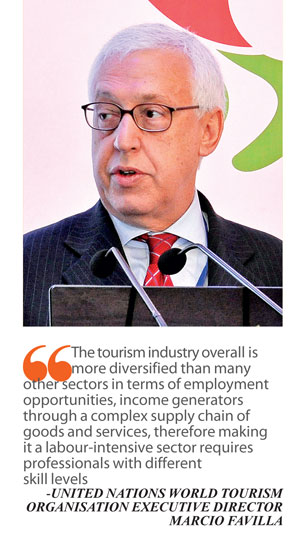 He asserted one should not be shocked to see Sri Lanka losing its employees to the Middle East as it is only obvious for people to look for greener pastures elsewhere.
He asserted one should not be shocked to see Sri Lanka losing its employees to the Middle East as it is only obvious for people to look for greener pastures elsewhere.
Although Sri Lanka would not be able to match the pay scales offered by the Middle East, he suggested the employers to add to the basic salary, the Employees’ Provident Fund (EPF) and Employees’ Trust Fund (ETF), gratuity and overtime calculated on the service charge.
Further, Dissanayake noted the almost total absence of real-time hard-core learning and development for employees in the industry and at company level.
“Once they pass out from our school, I do not know how much learning and development (L&D) they get in the industry. Very often we see in school how creative and talented these students are, but once they enter the industry, they are not given the opportunity as the senior people stifle them. This is one of the main reasons for the brain drain to the Middle East,” he pointed out.
Dissanayake went on to say that there has been no significant investment in training. “Training budgets are usually the first to go. If we want to deliver a world-class service, we have to invest in it. There is no way round that,” asserted Dissanayake.
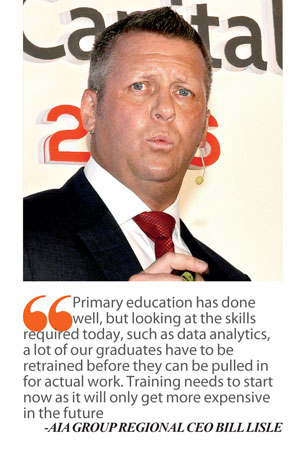 Hiccups in financial services
Hiccups in financial services
Asia is the powerhouse driving the global economy and the human capital is at the centre of it. To ensure the sustenance of this position, AIA Group Regional CEO Bill Lisle stressed the need to focus on millennials as they comprise of about 50 percent of the world’s workforce. By 2050, this is expected to increase to 75 percent and it will be no different to Sri Lanka.
Since characteristic-wise the millennials are considerably different from the rest of the generation groups, Lisle stressed it is imperative to understand how to harness that potential since their values and focus are different to other groups.
“They are a very different animal to the baby boomers. Millennials have a totally different view of the world; they want to be part of a team, want to be part of a company that is a social conscious; want to be engaged, empowered and add value to the organisation they are working for. We need to adapt to them, not the other way around,” he said.
The next area that needs attention is collaboration among financial institutions, which has never been an easy task.
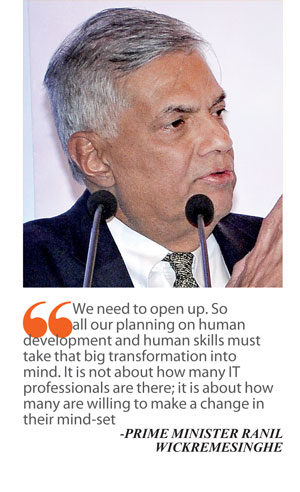
According to Lisle, it is time financial service institutions moved from competing to collaboration, to supporting each other and help build talent pools rather than poaching each other.
“We need to make sure we have the right people servicing the customer, at the right time, at the right place, in the right way. That will be the key for the industry development in the next five to 10 years,” pointed out Lisle.
While the market has more graduates than ever before, he noted most are not ready for work.
“Primary education has done well, but looking at the skills required today, such as data analytics, a lot of our graduates have to be retrained before they can be pulled in for actual work. Training needs to start now as it will only get more expensive in the future,” he stressed.
“There are key skill shortages today. We need to identify them and partner for the future to bridge some of those skill gaps before it’s too late,” added Lisle. Sharing similar sentiments, Standard Chartered Bank Sri Lanka CEO Jim McCabe noted that while traditional training is vital for development, embracing the on-going shifts in this regard should be acknowledged and understood by financial institutions if they want to make the most of their workforce.
“There has been a lot writing by the community about the shifts - that is moving away from classroom training to more desired premises. The shift has to be through knowledge transfers, online, podcast and use the classroom to stimulate practice and not just teach,” he opined.
Acknowledging that supported learning is imperative to help learn and develop further while performing the job, moving from the activity-based measurement to an outcome-based measurement is the current theme.
Commenting on the success of Standard Chartered, he said it is primarily due to having understood the need for a more combined approach for training and development.
Underling issues in ICT sphere
Based on the discussion that took place around the human capital development in the ICT sector, it was understood it does not have as many issues as the other sectors since the private sector has taken the lead. Not only does the industry involve heavily in the development of talents, it also ensures the pay scales are high, which has resulted in greater interest amongst school leavers to enter the field despite tough and long working hours.
Touching on the skill gaps in the sector, Development, Welfare and Labour Economist Dr. Ramani Gunatilaka noted that although the perception is that the English language is the problem, it is not so, since employers seem satisfied with the “university product”. Although 25 percent do have issues in working in an English-speaking environment, all ICT graduates are employed no sooner they leave university.
“The private sector employers, the potential employers, are at the council at many of these universities and that makes a huge difference in the kind of graduate that is produced. They have looked into the kind if graduates the industry needs.
Soft skills are lacking, but the sentiment of employers is that it can be fixed. The issue is below that,” said Dr. Gunatilaka.
The issue according to her is that at present, school kids are not given the necessary knowledge required for the kind of jobs the ICT sector will offer in the future.
“That is the fundamental point. If you look at the ICT sector, they are generally better educated, but if we don’t improve the skills of those entering, we will lose the quality of the pool. So basically we are in a situation where 50 percent of workers would be secondary educated,” she said.
“I don’t think people really recognise how the primary school system retards the thinking capacity and the innovative capacity of a child,” she added.
Recalling an incident that took place in a leading school in Colombo where a primary student was asked to draw and colour the sky, the young student was frowned upon for painting the sky grey, which is an act that only limits creative thinking, according to Dr. Gunatilaka.
She quipped that having done a lot of work with the fishermen, they are lot more able, analytical, independent and original than the graduates working in the divisional secretariats.
Logistics: Lack of attention, not a priority as it should be
Those representing their respective sectors at the summit had one common message to share. Those who represented the country’s logistics sector were no different. They grumbled that the sector is not given its due emphasis although authorities continue to build castles in the air as to where they plan taking the industry in the future.
The lack of attention has resulted in a talent dearth, which is crippling the promising industry.
According to Sri Lanka Logistics and Freight Forwarders’ Association Chairperson Tania Polonnowita Wettimuny, the government must play a greater role in encouraging education in the logistics and shipping sector to at least the O/L standard as the country is positioned to be a logistic hub in Asia. For more jobs in the sector, she said, it is a must to introduce trade and transport as an optional subject from the sixth grade in school.
“The Higher Education Ministry too must introduce diplomas, higher diplomas and degrees at all universities and must encourage the subject of transport as a stream,” she noted.
Taking the discussion further, Aitken Spence PLC Director and Aitken Spence Maritime, Logistics and Cargo Chairman/CEO Parakrama Dissanayake stressed the need to understand the changing context of the industry.
According to him, Sri Lanka has an agency mind-set, where it is about representing someone.
“The individuals must come out of it. John Keells is one that went beyond the mind-set of an agent. But since then, there is Expo Lanka and Aitken Spence. We need to understand that we have a small market and our export volumes low. The biggest problem is that we have line managers but a tremendous dearth of general managers,” he stated.
When asked if Sri Lanka is not geared to face changes, Dissanayake responded stating that to be geared the nation needs to embrace change as it aims to become a global logistics hub.
“But look at the reality. There is a tender for the East Terminal and the top five port operators are not allowed to bid. So, if you are talking about being a hub, we need change. It is all about execution. You can have a vision and that is no use if you don’t execute it,” he charged.
Meanwhile, Hemas Group Logistics and Maritime Managing Director Kasturi Wilson said while all corporates are striving to give equal opportunities to all contenders and ensure there is no gender discrimination, there is a need to believe that there is future and growth.
This, the corporates would believe, but there is frustration in understanding what is in the paper and what needs to be done.
“We talk of Sri Lanka being a logistics hub but we don’t see what it takes and what competencies are needed. We don’t see the reality. Though our corporates are geared, we are playing around in the domestic logistics side. Our opportunities for employment in that are not growing as faster as expected. So it’s frustrating,” she said.
According to Wilson, investment and working with education institutions are necessary to create a level of understanding as the general perception of logistics is of a truck delivering a parcel.
“We need to evolve and for that we need innovative ideas but we need to know what the government wants to do,” she added.
According to Sri Lanka Shippers’ Council Chairman Sean Vandort, logistics is still in the “poverty mentality” game.
“Logistics was never seen to play a pivotal role in the maritime space. It is in the lower order and the government did not make the policies to see proper talent rising up from the grass root level,” he charged.
To give the sector its due recognition, the government was urged to introduce logistics at school and grassroots. However, while all blame cannot be piled on the authorities, the discussion highlighted that private sector companies were also at fault for driving away the existing workforce as they are expected to work more for lower pay.
“We would like to see a fair wage structure. The executive post is like overworking a bull. It is to save costs and get the maximum. This results in the majority dropping out. For a mere Rs.5000 increase they go abroad. That’s where we lose the people,” noted Vandort.
While the government is confident in becoming a logistics hub in the coming decade, sentiments of the industry stakeholders seemed otherwise.
Challenges in construction: A long way to go
While the construction sector should be gearing up to play a greater role in the nation’s development agenda, Chamber of Construction Industry (CCI) President Dr. Surath Wickramasinghe charged that it is leaning towards the gloom instead of picking up.In a hard-hitting keynote address Dr. Wickramasinghe said that while modernising construction is a tough nut to crack, the nation has a long way to get things right, especially in the area of human resources.
“For various reasons, despite long-running improvement agendas in most of the world’s most developed markets, construction in Sri Lanka remains a wasteful, tradition-bound industry plagued by delays, cost overruns and contractual disputes,” charged Dr. Wickramasinghe.
Noting that the numbers joining the construction industry have drastically reduced, Dr. Wickramasinghe attributed the dip to the lack of security and safety measures. Workers also refrain from entering the industry, as it is feared they may be laid off during a slump in the economy.Another challenge in attracting workers according to Dr. Wickramasinghe is that there is no dignity of labour as all construction workers are classified by the type of work they do and are not respected by the public, who label them as masons, carpenters or similar names.
“This has affected particularly the young school leavers, as they look for white collar jobs and are against working in the construction industry as welders, fabricators, electricians, masons, carpenters and plumbers,” he noted.
It was stressed that the government must play a greater role, along with the chambers of construction and the other allied associations, in facilitating a campaign to attract the youth to the industry. The youth should be given a better understanding and picture of the advances made in the construction industry, particularly in the 21st century, where modern technology has been introduced, not only for the purpose of construction. “Such action could transform Sri Lanka’s construction industry to be competitive with any other developed country,” stressed Dr. Wickramasinghe.
It was pointed out that when embarking on the vision set by Prime Minister Ranil Wickremesinghe for the next phase of economic transformation of Sri Lanka by 2020, it is imperative for the construction industry to meet its challenges. The pre-requisite is to ensure its human capital. According to Dr. Wickramasinghe, the way forward for the construction industry requires five strategic thrusts, which are – enhancing the professionalism of the industry, raising the skills level, improving industry practices and techniques, adopting an integrated approach to construction and a collective championing effort for the construction industry.
Having identified the demands of the human capital in the different sectors of the construction industry, Dr. Wickramasinghe stressed it would be necessary to determine whether such sectors have reached the threshold in human capital and frame a policy environment that would be appropriate to meet the challenges.

Add comment
Comments will be edited (grammar, spelling and slang) and authorized at the discretion of Daily Mirror online. The website also has the right not to publish selected comments.
Reply To:
Name - Reply Comment
On March 26, a couple arriving from Thailand was arrested with 88 live animal
According to villagers from Naula-Moragolla out of 105 families 80 can afford
Is the situation in Sri Lanka so grim that locals harbour hope that they coul
A recent post on social media revealed that three purple-faced langurs near t